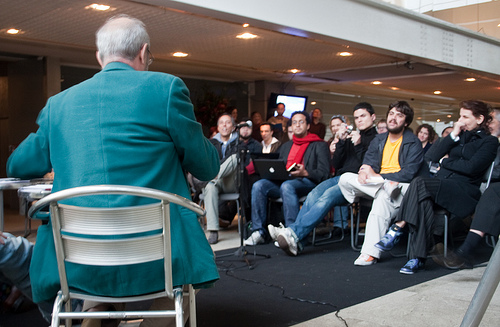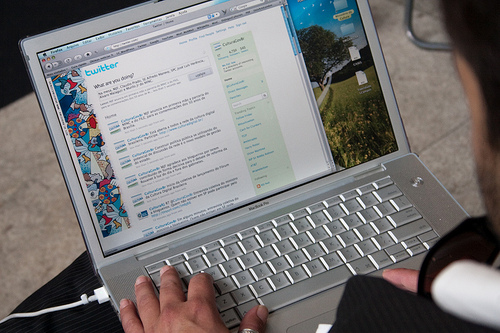Cyberspace is more and more inhabited by government institutions in many countries. Whether it is for the sake of elections, as during President Obama's campaign in 2008, or for the sake of fighting for fair elections as recently happened in Iran when Twitter was used by the Mousavi campaign, during the election and also in the subsequent demonstrations.
Despite the fact that the 2010 presidential race is already warming up on the Brazilian Internet, as future candidates start to blog and twitter to promote themselves online, the government has just taken the first step in becoming digital. On 31 June the Ministry of Culture and the National Network of Education and Research officially launched the Forum for Brazilian Digital Culture. The project consists of a social network that aims to encourage Brazilian netizens to collaborate in creating a new mode of addressing public policies.

Brazil's Digital Culture Forum banner
This initiative has gone down well with Bloggers and twitter users who think that the government has finally made an effort to reach out to people and include them in public policies through the Internet, a direct and bureaucracy free communication tool for contacting citizens. The network was initially limited to only 300 people, but after its launch, it has been opened to anyone interested in #culturadigitalbr, as it has been referred to on Twitter.
Lady Bug Brasil [pt] was invited to the launch of the event. She commented on her blog [pt]:
Em tempos de luta, censura e políticas públicas que precisam de retoques, é um alívio saber que há esperança e iniciativas democráticas que abrem espaço para as muitas vozes que habitam a rede.
Gilberto Jr from the startupi blog was also invited to the launch. He blogged in English:
The simple fact that the federal government initiated this project is highly commendable. It opens discussion within communities, using the web as a base to stimulate discussion and create a kind of digital democracy (not just in the world of computing, but in Brazil in general).
The project features some other social network characteristics such as a Facebook-like wall-to-wall comment system and the chance to aggregate online discussions taking place on forums or Orkut. Everyday, new users join the network and many discussion topics have been created. Another interesting point to the launch was that many bloggers were invited to the press conference alongside the mainstream media.

Bloggers at the Q&A session with the Minister of Culture Juca Ferreira. Photo by Flickr user Andre Deak
Filipe Saraiva from the Liberdade na Fronteira blog [Freedom at the Frontier, pt] gives his thoughts on this case. He praises the government saying [pt]:
Penso ser uma iniciativa bastante louvável por parte do governo. Em tempos de repressão ao compartilhamento na rede, vistos nos recentes casos do julgamento do The Pirate Bay ou no Projeto de Lei Azeredo, fomentar um espaço de discussão pública sobre um tema ainda bastante controverso mostra disposição e abertura para novas práticas e idéias que surgem no ciberespaço.
Twitter user @raquelcamargo highlights a possible problem on the Forum, tweeting [pt]:
As discussões no Fórum da Cultura Digital acabam rápido, sempre com poucas mensagens.
CulturaDigitalBr has five main subjects up for discussion at the moment. They want to build guidelines for the access, production, promotion, preservation and free circulation of culture on any of these themes and topics are divided as follows [pt]:
1. Memória Digital (acervo, história e futuro);
2. Economia da Cultura Digital (compartilhamento, interesse público e mercado);
3. Infra-estrutura para a Cultura Digital (infovia, acesso e inclusão);
4. Arte Digital (linguagem, democratização e remix);
5. Comunicação Digital (língua, mídia e convergência).
2. Digital Culture Economy (filesharing, public interest, marketplace);
3. Infrastructure for Digital Culture (information highway, internet access, digital inclusion);
4. Digital Art (language, democracy and remixing);
5. Digital Communication (language, media and convergence)
They also highlight the following, on the same page [pt]:
Caso você queira discutir um tema que não caiba em nenhuma dessas áreas, crie seu grupo, convide quem mais possa se interessar por ele e toque a conversa. Este é um espaço radicalmente aberto às suas idéias e opiniões. Dependendo da dimensão que ela tomar, o coletivo pode decidir por transformá-la em eixo oficial do Fórum. Questões relevantes como o acesso ao conhecimento científico, a educação e a diversidade são transversais e, sem dúvida, são objeto desta conversa.

The tweeter responsible for the Ministry of Culture's twitter account is shot live-tweeting the event. Photo by Flickr user André Deak
Bloggers think that this initiative is very positive and that step by step the Brazilian government is changing its conception of how the Internet and its users might contribute to the way public policies are made currently. As a matter of fact, it seems that not only Brazil but many other countries are also embracing social media as a tool for keeping in touch with their citizens.







5 comments
Hello Friends,
This one is just to say that the experience of being a Global Voices editor for 3 years brought me invaluable perspectives on how to build effective networked environments. I am now coordinating the process of the Brazilian Forum for Digital Culture — a new collaborative way of building public policies — and I am glad to see that the GVO Portuguese team was able to capture positive reactions to our project.
Many thanks to all GVOers! I look forward having the chance to work with you all again sometime in the future.
Hugs.
Jose.
Congratulations!